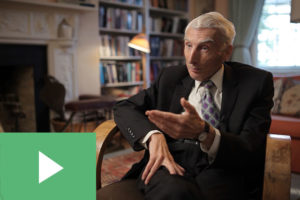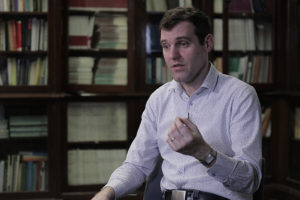Space Exploration
Cosmologist Martin Rees on the history of space exploration, Sat Nav, and why robots are better than humans fo...
The video is a part of the project British Scientists produced in collaboration between Serious Science and the British Council.
My interest is in behavioural genetics. It is looking for genetic influences on why people differ in behaviour so some people become schizophrenic, some children have reading disability. So I’m interested in what causes those differences and for a century in psychology people assumed all that’s important is the environment and especially the environment your parents provided in the first few years of life. That’s from Freud onward. But what we’ve learnt using behavioural genetics is that DNA differences between people account for almost half of the differences between people. This is far bigger than all the other effects in psychology put together, so not only does genetics matter. It matters in a lot for almost all areas of psychology: mental health and illness, cognitive abilities, personality, school achievement.
We call nature is genetics, nurture is environment. So, this is the longest standing controversy in psychology: nature and nurture. For a long time people thought everything that we are is due to nurture. We’ve shown that nature, genetics is very important. This goes back a hundred years or so when the first behavioural genetic techniques were developed: twin studies and adoption studies. The first ones were done in the early 1900s primarily in England but also in other countries of Europe. The twin method involves comparing two types of twins. One percent of all births around the world are twins. One third of those are identical twins. They are called monozygotic because they are one fertilized egg, a zygote, they are like clones of one another, they have the same DNA. The other type of twins, two thirds of all twin births are called dizygotic, two zygotes. They are like any brother and sister but they happen to be born at the same time in the same womb. The twin method consists of comparing these two groups. If a trait like musical ability is influenced by genetics you would have to predict that the identical twins are more similar than the non-identical twins. It’s like a biological experiment.
The other method is the adoption method. The twin method is like a biological experiment: you got these two types of twins. Adoption is like a social experiment. Nature and nurture run in families. So for a long times psychologists knew schizophrenia runs in families. No problem, that’s the environment, that’s because the parents did weird things to them, parents made them schizophrenic. But they ignored the possibility that genetics is important because genetics runs in families. Parents and offspring share are 50% similar genetically. The adoption method says let’s look for genetic parents and environmental parents because kids adopted away at birth, those parents still gave them their genes but they don’t see those parents, they are their genetic parents. But adopted children are adopted into adoptive family for the adoptive parents are environmentally related. It’s a straightforward powerful test of genetics because it predicts that these biological birth parents who don’t share environment of the kids how similar are they to the children is a direct test of genetic influence. Similarly, how similar the kids are to their adoptive parents is a test of environmental influence.
The twin and adoption studies have convinced people that genetics is important so much so that we’ve now challenged psychologists to come up with any trait that is not heritable. We’ve gone from thinking nothing is heritable to realising everything is heritable. What we are now doing is using these techniques to study more interesting issues. For example, about development. How early does genetic influence appear?
There’ve been some interplay between nature and nurture. I’ll just give an example of that. We have hundreds of measures of the environment that are used in social sciences. Life events, things like financial disruptions — stressful life events are used in several thousand studies. But it has just been assumed that environmental measures are environmental. But what we’ve shown many people around the world these environmental measures show almost as much genetic influence as other psychological traits.
And when you start thinking genetically you say that’s not crazy. What are these measures? It’s not the measure of the environment out there which is the way psychologists used to think of it. The environment is what happens to us, what’s going on is that in psychology our environmental measures are measures of our experience, life events like financial disruptions, having trouble with relationships, getting in fights with people, losing your job. This is not the environment out there that happens to you passively (you don’t know anything to do with it), it’s what you do with your environment. And that’s where the genetics comes into it. That’s a good example of how a genetic perspective has changed the way we think about the environment. I believe it’s a fundamental principle that the way genes work is through their correlation with the environment, how we use our environment.
Language development has been studied a lot. Children differ greatly in how early they learn to speak (Einstein didn’t begin to speak to the age of three) and also how they developed throughout life in terms of verbal fluency (how easy they find it to talk fluently) and also vocabulary. So, that’s your first language learning.
An interesting question that behavioural geneticists have begun to address is about learning the second language, how does that fit with it. It turns out that many of the same genes are involved. People who are good at verbal measures in their first language will tend to be pretty good in a second language. But there are some specific genetic factors. The bottom line of that research is that about a third of the genetic influences on learning a second language are overlap with the ability to learn first language, but about a third of the genetic effects are different, and then about a third overlap with just general intelligence.
So these adoption studies have been used for most areas of psychology that involve individual differences that is we’re only asking about what makes people different. 99% of all our DNA is the same. We’re all identical, but we’re asking the extent to which the 1% of DNA that differs makes people different. That’s what we’re doing in behavioural genetics, we’re studying differences.
Much of psychology and the life sciences is not asking about individual differences, they are just asking about universal questions about the human species. But we’re asking why are some kids reading disabled, others not, why are some schizophrenic, others not. A real transformation of research in this area up until now people have been concerned about just simply asking whether genetics is important and then asking how important. That question has been pretty much answered across-the-board. Some people still don’t accept it but the vast majority of people do. Not only is genetics significant, it’s very substantial for almost every area of psychology. That’s been so well ingrained that it is no longer interesting to say this trait is heritable because everything is heritable. We go beyond that to ask questions about the development, about the relationship between traits like a big issue right now is in psychopathology and mental illness there is all these different diagnoses.
The biggest thing of all is to go beyond heritability to say: “Let’s find the genes”. That’s a sort of a molecular genetics and that’s the hot thing now. Things are heritable, fine, let’s find the genes because if you can find the genes, you can do so much more in terms of research but especially in terms of translation to important problems. DNA is the best tool we have for predicting problems at which allows us to intervene to prevent problems which is the way all of medicine is going. You know, rather than waiting until you’re alcoholic and then try to cure that, until you’re obese and try to cure that, if you can predict who is going to have those problems, you could intervene to prevent the problems which is much more cost-effective for the individual but also for society.
The excitement now is about trying to find these genes and we are at the turning point where we are beginning to find genes which will allow us to make individual predictions about genetic risk and resilience, vulnerability and strength which will eventually allow us to predict problems and then hopefully begin to prevent them.

Cosmologist Martin Rees on the history of space exploration, Sat Nav, and why robots are better than humans fo...

Meteorologist Chris Brierley on the first measurements of climate, weather forecasts and how can we double che...

Research team discovered that 35 million years ago the ancestors of hippos were among the first large mammals ...